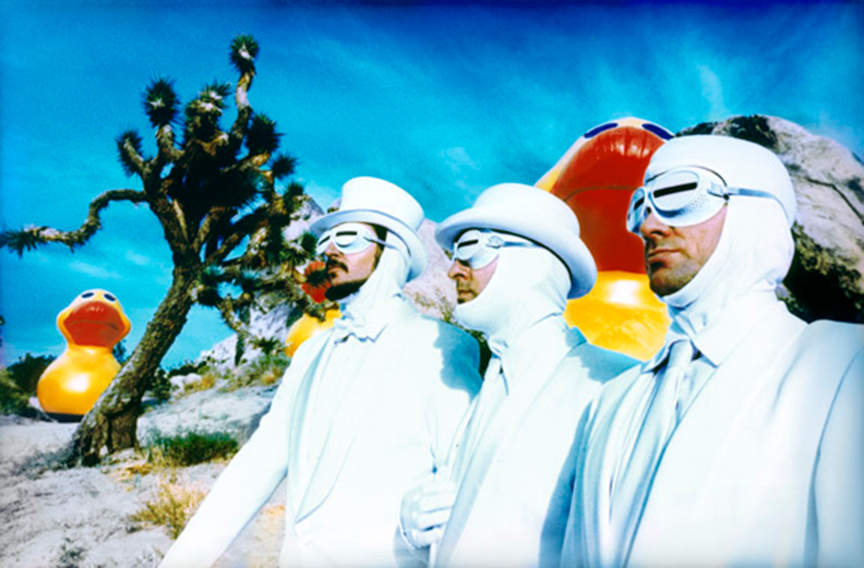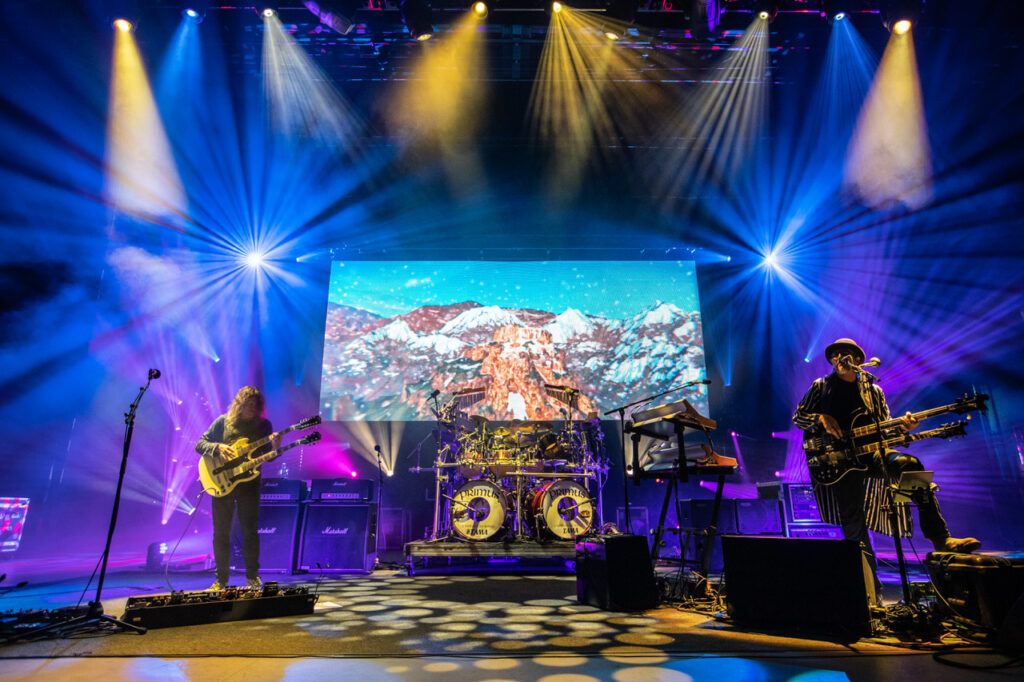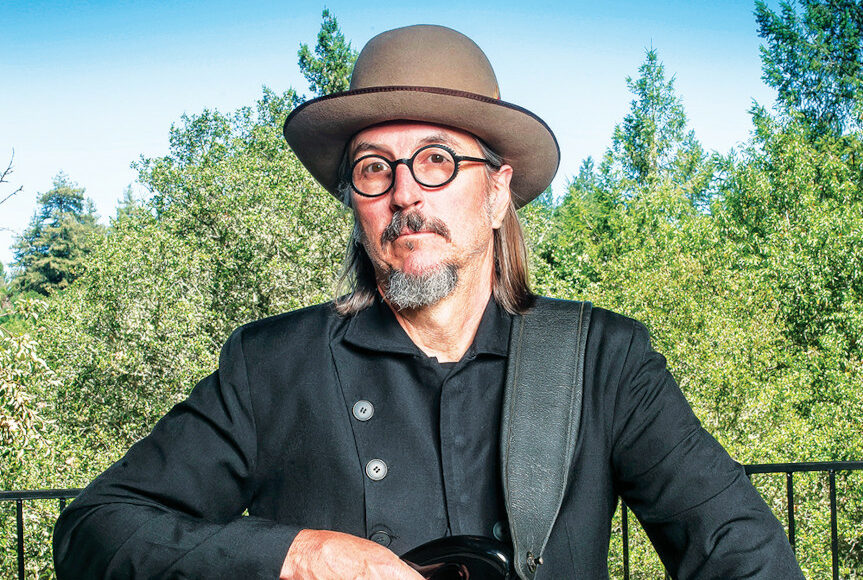“Is Primus a weird band?” is one of the top questions regularly asked about the longtime alt-rock trio, according to Google.
Who’s to say what “weird” means these days? Primus founder Les Claypool could be considered the ultimate wizard of weird—he looks like a gangly lifelong film school student raised in a commune of rednecks, but he’s also arguably one of the greatest slap bass players ever. He’s on Rolling Stone’s “50 Greatest Bassists of All Time” list, and his variation of thrash-funk playing has been hailed for his innovative treatment of the bass as a lead instrument.
“One of the big things I decided to do when I was starting out was to play with three fingers,” Claypool tells me. “A lot of guys play with two fingers, so I figured if I played with three, I could be faster.”
If you need direct evidence of his talent, check out his manic opening on Primus’ “Jerry Was a Race Car Driver” (Claypool taps the main melody on fretless six-string bass) or his Mach 3-strumming throughout “Pudding Time.”
In addition to his superhuman bass ability, Claypool’s music—a madcap mashup of Frank Zappa, Captain Beefheart and Parliament Funkadelic swimming in a river of LSD laced with mescaline—is otherworldly, freak-flag-flying experimental funk-rock. The videos Claypool makes are even freakier. “Mr. Krinkle” features the Primus frontman sporting an ominous pig mask as he plays double bass in an abandoned warehouse while a creepy carnival unfolds behind him. The trio dresses like plastic toy cowboys who call themselves “Buck Naked and the Bare Bottom Boys” in “Wynona’s Big Brown Beaver.” That’s just the beginning of a lot of strange material.
Whatever twisted psychedelic hillbilly dimension he guides listeners—and viewers—into, one thing that’s remained consistent throughout the last four decades: Claypool is in perpetual motion. He is one of the most prolific artists on the planet. In addition to Primus, Claypool’s short and long-lived list of side projects, including jam band supergroups like Oysterhead (with Phish frontman Trey Anastasio), Colonel Claypool’s Bucket of Bernie Brains (featuring guitarist extraordinaire Buckethead) and the Phil Zone (with Grateful Dead bassist Phil Lesh), continues to grow.
In 2021, Primus kicked off a 46-date tour performing Rush’s seminal A Farewell to Kings in its entirety. Claypool even garnered approval from the members of Rush—including bassist Geddy Lee, who also appears on the “Top 50 Bassist” list.
“I really got off on watching how [Claypool] approached the instrument,” Lee told Rolling Stone. “He used to say to me, ‘You’re a big influence on me,’ but he’s got his own style. He has a sense of rhythm that I [find] very appealing.”
This year is gearing up to be a Claypool whirlwind of project after project. Primus released a new EP, Conspiranoid, centered around an 11-minute tune. He put together another supergroup to record one song to raise money for the people of Ukraine a day after Russia invaded the country. Primus is performing the South Park (Claypool penned the show’s opening theme song) 25th Anniversary Concert at Red Rocks with Trey Parker, Matt Stone and Ween. In addition to more “Primus: A Tribute to Kings 2022” shows, Les Claypool’s Bastard Jazz, yet another Claypool supergroup, set off on a special tour that begins this week and goes through the first week of August—including a show July 31 at the Rio Theatre in Santa Cruz.
The guy is so goddamn busy that our interview had to be rescheduled five times. After reading, you will concur: It was well worth the effort.

Where are you right now?
LES CLAYPOOL: Saskatoon, Canada.
Let’s start with wieners—specifically, Whamola Wieners, now sold at Claypool Cellars [also known as Pachyderm Station], your winery in Sebastopol, California. What inspired you to begin serving gourmet hot dogs?
During Covid, you couldn’t have a tasting room open in Sonoma County unless you had food service. I started looking at taco carts, food trucks and whatnot, and I stumbled across this 20-foot fiberglass hotdog trailer. I got on Craigslist and found one in San Diego, so I bought it; we started serving the gourmet franks at our tasting room for special events. It’s sort of evolved into a pretty cool thing. My daughter was running it at first, but it’s just grown into this wonderful little sideshow at our tasting room.
It’s only natural that we move from wieners to balls. Shortly after Russia invaded Ukraine, you released the single, “Zelensky: The Man with the Iron Balls”—all proceeds of the track benefit Nova Ukraine, a nonprofit that provides humanitarian relief to the people of Ukraine. You collaborated with Gogol Bordello’s Eugene Hütz and Sergey Ryabtsev, the Police’s Stewart Copeland, Sean Lennon and Billy Strings. How did the project come together?
I was in the middle of four different recording projects. I had zero time, energy or inclination to do any of this. I was hanging out with some friends from Poland on February 24, the night of the invasion—two of them were actually in the U.S. on vacation with their family and were getting ready to head back to their home in Poland, which is like 50 miles from Ukraine—and they were flipping out. We started commiserating, drinking some vodka, and I ended up texting with Eugene [Hütz] to get his perspective on things; he’s got family [in Ukraine]—he’s been coordinating getting food and lodging and whatnot for all his people. We just got to talking, and we were very impressed by the fortitude of Mr. Zelensky. It led to this notion of “he’s got balls of steel,” which led to “The Man with the Iron Balls.” Then I put the word out. We didn’t have much time, so we did it quickly. Sean Lennon is a buddy of mine, and we have [the Claypool Lennon Delirium] project together, so he jumped on board, and Stewart Copeland got on board. Of course, Eugene and Sergey [Ryabtsev] jumped on board, and Billy [Strings] and I have been working on a recording project, so he jumped on board. It all just fell together. [The song] is not a condemnation of anybody; it’s more about pointing out the fortitude, bravery and quality of this leadership I haven’t seen in my tenure on the planet. I would assume [Zelensky] is gonna go down in history as a Patrick Henry-type picture. As opposed to hopping on a helicopter and flying to some golf course to wait out the hostilities, he hunkered down and said, ‘I need weapons, not a ride!’ That’s an amazing thing. I have all these friends that are directly affected by what’s going on over there. [The song] was something that needed to be done.
Primus’ tribute to Rush’s ‘A Farewell to Kings’ has taken on a life of its own. Rush’s bandmembers have even given you props. What inspired you to take on that project?
Rush was my world when I was first starting to play when I was a teenager. They got me into doing what I do. So obviously, as you move through life, you acquire other influences and whatnot. But as far as what got me started [as a musician], it was definitely Rush. I could speak for the other two guys [Larry LaLonde and Tim Alexander] in the band, as well. We’ve always joked, “Hey, we should go out and do Rush’s Hemispheres in its entirety.” We’ve done these conceptual projects on tour before—I did Pink Floyd’s Animals years ago with [the Les Claypool Frog Brigade]. Then we thought, “Well, maybe we should do something like Hemispheres”—this was a few years ago when Neil [Peart] was still on the planet. We thought, “We can’t do Hemispheres or 2112 because they’re too obvious. And Moving Pictures would also be too obvious. So, we said, “Let’s do A Farewell to Kings.”
We’re in Canada right now playing the Rush album, and people are flipping out. We even got to play A Farewell to Kings for [Rush’s] Geddy [Lee] and Alex [Lifeson] in Toronto a couple of weeks ago.
It’s been an amazing thing, and it’s been great for the band because we actually had to rehearse. We’re lazy bastards [in Primus]; we very rarely rehearse. But we had to buckle down and learn this stuff—you can’t fake Rush. You gotta do it right. It was a good bonding experience for the three of us, and it also led to these new compositions on the [EP] that we just released. Learning A Farewell to Kings for the [tour] was therapeutic for us, and it continues to be.
Since Rush is a Canadian band, has the show been received differently by audiences in Canada compared to the U.S.?
I think Rush fans are just Rush fans. They’re like Trekkies. They’re very devoted, very knowledgeable and very scrutinizing. When we toured with [Rush in 1992], they were amazing to us. Once, I talked Geddy and Alex into bringing the Melvins out to open for them on one of their tours, and it just shocked the shit out of all the Rush fans. I remember being at the Cow Palace and watching the Melvins melt all these people. The [fans] were all very polite about it, but you could tell it was not the band of choice for them to be experiencing.
You said that Primus rehearsals are very loose, so how did you and the other band members switch gears while prepping for ‘A Farewell to Kings?’
I’ve rehearsed many things a lot. When I do an Oysterhead project with [Phish’s Trey Anastasio], we have to rehearse. When we do the [Lennon Claypool] Delirium with Sean [Lennon], Sean likes to rehearse. When “rehearsing” Primus material, we tend not to [rehearse]. It’s always been a very rare thing for us. But obviously, when I did [Pink Floyd’s] Animals in its entirety years ago with the Frog Brigade, we had to rehearse our asses off, so I don’t object or deter from rehearsing. When Primus gets together, we jam it out a little bit—play some of the old tunes, but we just get it. The songs are ingrained in us. We’ve played them for so long that it’s almost a muscle memory. When we took on the Rush thing, we had to really hunker down because that shit is hard.

I read that sometimes you use your son Cage as a sounding board, and he offered you advice about the Rush tunes that you struggled with as far as recreating Geddy’s extremely challenging vocal range.
Geddy Lee is way up in the ultra-stratosphere with his vocals. It’s all difficult. But yeah, [Cage] basically just said, “It sounds great, but you should sing [the Rush songs] the way you would sing them. Don’t try to sing like Geddy, because it’s up there.” But some Primus songs are up there too. At the end of [Rush’s] “Cygnus,” there’s a really high part, and I just put on my “Sgt. Baker” voice, which is a Primus song that has vocals that are kind of up there—I just go into that character. It’s a good combination of my approach and paying homage to Geddy’s [approach]. But even Geddy says he can’t believe how high he sang this stuff back in the day. He can’t do it anymore.
Your son is working on a Primus documentary, correct?
Yes. He’s a fledgling filmmaker. He’s directing the Primus documentary; he’s gone through something like 760 video cassettes of old footage. He’s made a couple of little short films, and he’s done a lot of visuals for us and a lot of visuals for the Rush material and [Primus’] “Conspiranoia” video. He’s working on a “Follow the Fool” video right now.
Your latest project, Les Claypool’s Bastard Jazz, features an incredible lineup of musicians. From the live performances on YouTube, it’s evident that the four of you gel incredibly. How did the group initially materialize?
Mike [Dillon] and I were in Frog Brigade for years, and I’ve known Stanton [Moore] for a long time, though we haven’t ever done a project together. I initially did Bastard Jazz for the comedy festival up in San Francisco [Clusterfest]. They asked me to put together a project, and I said, “I want to do an all-improv thing. I’m just going to call it ‘Bastard Jazz.’ I’m just going to get a bunch of guys together, and we’re going to walk on stage not knowing anything about what we’re going to do—no rehearsals, no nothing—and just start jamming.” And we did. It’s pretty much the same lineup. I just have Stanton Moore on drums now. We just go on stage and start having a musical conversation without any preconceived notions.
Everyone also has a great time performing, translating to the audience’s energy.
I love playing with guys of this caliber who can just freeform, and dance on the edge of disaster. I feel like I have an amazing safety net. I mean, my amps can completely blow up, or I could fall off the stage or have a stroke or whatever the hell it is, and the show could go on, and it would still be amazing. These guys are all monsters. They’re virtuosos. It’s a very comfortable shoe.
Will there be a Bastard Jazz album sometime in the future?
I don’t know. We have been recording shows. We’ll look into it when we’re done [touring]. Right now, it’s a very casual thing. There is no preconceived anything. Even with the tour, I asked our manager to book a few shows, and suddenly we had a full-on tour. I was like, “What the hell happened?”
Meanwhile, Primus has recently released new material, including the 11-plus minute suite, “Conspiranoia,” featured on the Conspiranoid EP. How did it come together?
We initially wanted to do a 20-minute song, but we fell short. We ended up with 11-and-a-half minutes. I knew we were going back out on tour, and we’ve been playing so much and rehearsing so much; we were just this finely honed machine. We thought, “Well, let’s come up with some new material.” But we didn’t want to do a whole album. I said, “Let’s do a 20-minute song.” I had this idea for “Conspiranoia,” and I laid out an arrangement and had the vocals. Then we all fleshed out our parts, and we had this 11-and-a-half-minute song, so we needed two B-sides—it turns out that you need two B-sides to fit for vinyl; otherwise, you have this big empty space. So, we did two B-sides, which technically makes it an EP.
Is there something creatively that you haven’t done but have always wanted to do?
I’ve always yearned to be a filmmaker. I’ve written a bunch of screenplays, and I have directed a lot of videos—I also did a little mockumentary—but I’m kind of running out of energy for that. My son is taking up those reigns. We’ve been working on some projects, and we’ve been trying to breathe life back into some older stuff. The Pumphouse project, which is the screenplay that I’ve written, is now a novel in its seventh or eighth printing, I believe. It’s very relevant, and it’s very caustic. I’d like to get something like that going at some point, but you never know. I keep meeting amazing musicians like Billy [Strings] that I want to work with. So that’s what I do.
Les Claypool’s Bastard Jazz performs Sunday, July 31 at 8pm. Rio Theatre, 1205 Soquel Ave., Santa Cruz. $40/$50 plus fees. folkyeah.com.














